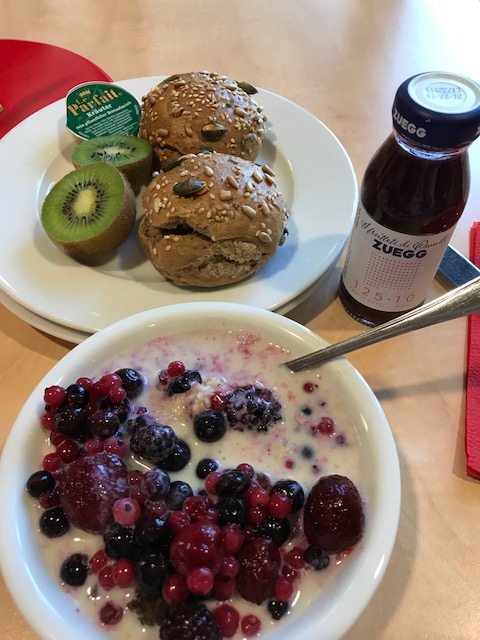Breakfast–The most important meal of the day!
Europe has amazing options for breakfast…from muesli to pates, vegan cheeses and meat alternatives (that can look like the real thing) to soya and other dairy free options. Here is a sample of Sojade yogurt and milk. Other brands unique to Europe include Alpro and Provamel.


Pure 100% pomegranate juice is fairly easy to find in Europe. Typically, lifestyle medicine physicians do not recommend beverages other than water unless someone is trying to enhance brain health or using antioxidant rich beverages for a specific time-frame for health restoration.
Berries (1 cup daily) for breakfast, along with 4 walnut halves is recommended by leading researchers and physicians, several of whom presented at the International Congress on Vegetarian Nutrition at Loma Linda University in February 2018. According to researchers, a cup of berries daily provide antioxidants and the walnuts help with metabolism stabilization.
When traveling in Europe, especially in the summer, fruit is plentiful and outdoor markets abound. Ask the locals the best place to shop and step out of the comfort zone and try something new. Here are a few berries that I’d never eaten before and gave a try. The dark purple berries were unique in flavour and the red ones somewhat tart. Neither were sweet, however loaded with antioxidants. And my mystery berries are …black currants and red currants.


The largest grape shaped berries pictured below are gooseberries and came in the burgundy colour pictured and green. They were the sweetest, however the other berries were good on cereal. I found these berries at a outdoor market in Switzerland. It was being held in a plaza square. These berries were plentiful in France, Switzerland and Germany (in June/July), as well as Norway at the end of May. I didn’t see them in Italy in June–however that doesn’t mean they weren’t available. Finding an outdoor market in Italy was not possible due to the travel schedule. Some outdoor markets are daily and others only certain days of the week. Ask the locals. They are always eager to help. When in France, ask “Parlez-vous anglais?”. Opening any conversation in France with this is helpful. 

A bowl of muesli loaded with a cup of frozen mixed berries (the red and dark blue ones above along with black berries, strawberries and raspberries in this mix), some plant based milk, kiwi (or sometimes other fruit) and small (100ml) bottle of pomegranate juice (before the meal) plus beans (not pictured) made up a typical breakfast. The two small wholegrain buns with a vegan pate were what was available this particular morning, however was not always part of the morning fare.
This was my breakfast in the Waldensian Mountains of Northern Italy.
Sending an email and checking with your hotel or host in advance for special meal requests is highly recommended unless someone is arranging the trip for you–even then make sure that everyone has confirmed your dietary needs.
Depending on what country in Europe, breakfast could be croissants and coffee (not part of a healthy WFPD) or it could be a heavily laden meat and cheese with a baguette spread. Searching out the local markets or grocery store and asking your host to hold things in a fridge for you is another option. Be sure to mention that you have special dietary or medical needs and they are typically extremely accommodating if there is not a fridge in your room or one that you can access.
Dr. Luken a lifestyle medicine physician in California also recommends two 8oz glasses of water upon rising, an hour of walking followed by a hearty breakfast including about 1 cup of beans and 6 almonds. The second meal Dr. Gallant recommends mid-afternoon (2pm or so) with water up to 15 minutes before meals and beginning 2 hours after again. Drinking 2 litres of water will help ensure hydration and aide in weight maintenance/loss. He notes that WFPD with 2 meals per day can aide in digestive issues, mental clarity, weight loss–unless thyroid irregularities or medication induced side effects are present, and provide ample calories and nutrients.
A word in closing about hydration and travel. Drinking at least 2 litres of water in the heat and humidity daily is a must. Avoid heat stroke (sunstroke) which can dampen travel plans. Here’s what to look for:
Hydrate, hydrate, hydrate! A quick way to help boost electrolytes is with some coconut water if needed.





